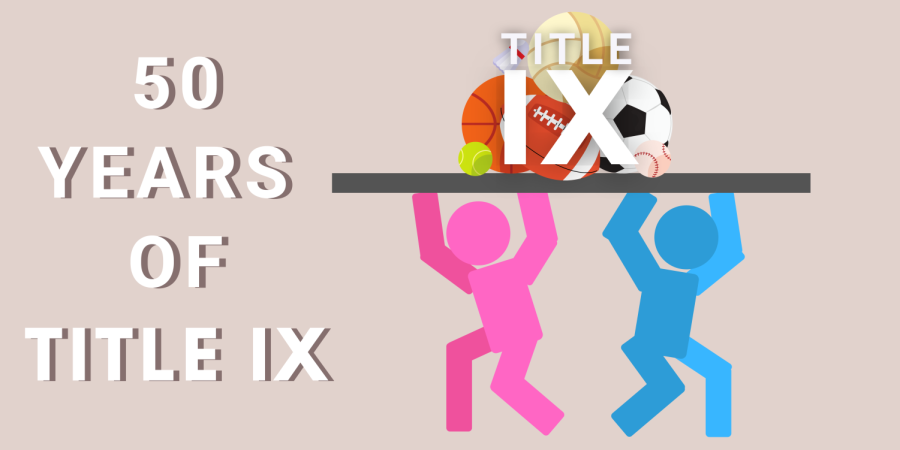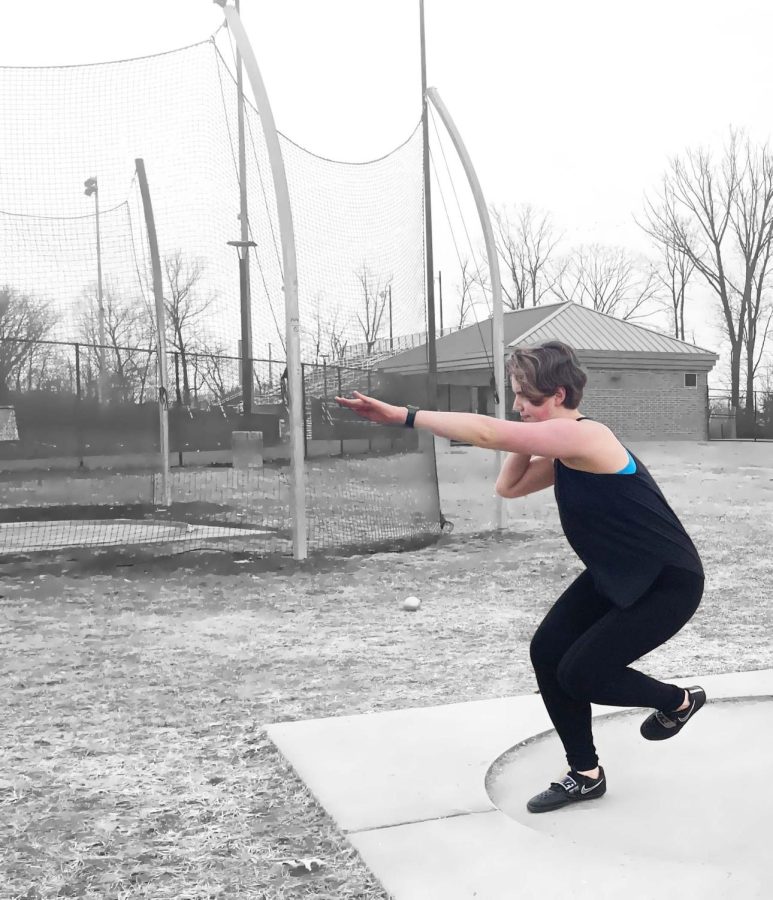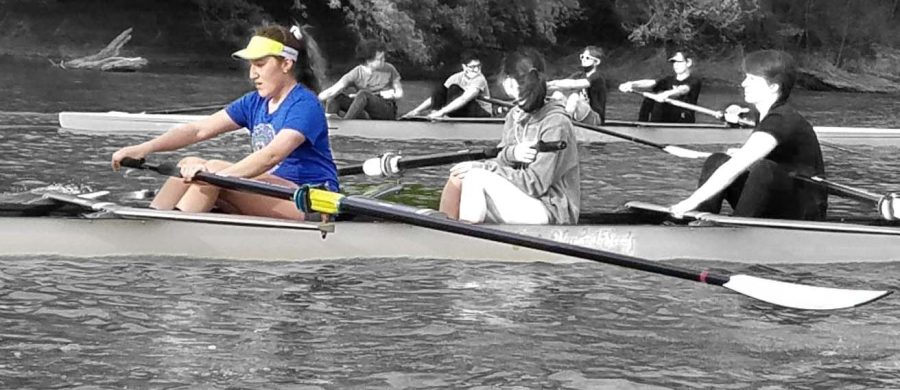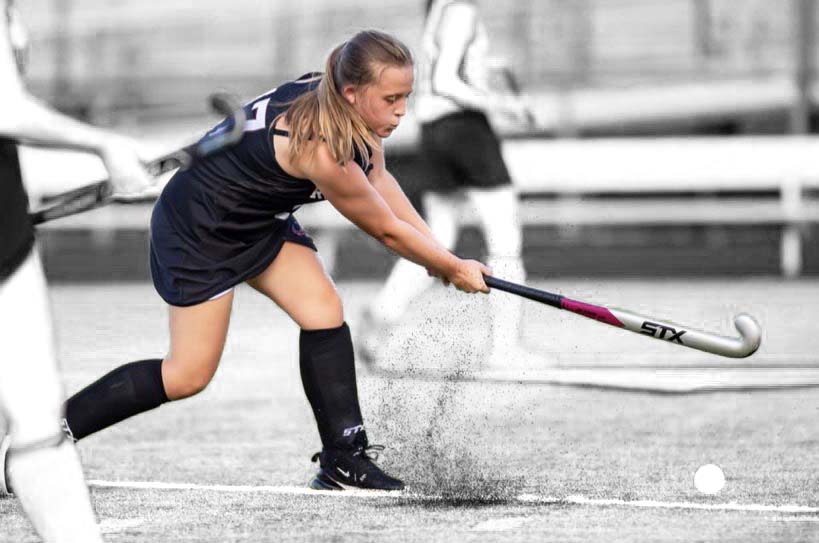50 Years on the Field: Title IX Still Impacts Student Athletes Today
To celebrate 50 years of Title IX, athletes reflect on their experience with high school sports.
February 22, 2022
Although women had the ability to play in sports before Title IX, they weren’t given the same equal opportunities as men. Title IX, now 50 years later, provides the same protections and equality for any athlete regarding equipment and participation in sports.
With bruised elbows, muddy sneakers, and a sports headband, Athletic Assistant Director Jennifer Virbickis spent much of her youth on the field.
Heavily influenced by her older male relatives playing sports like football, Virbickis often joined in. Yet, she was constantly told by society and loved ones about what sports girls could and couldn’t do. “I think there’s this huge stigma of what girls should do versus what boys should do,” Virbickis said.
Thinking back to her teenage years, Virbickis remembers following in her brother’s footsteps. “A rule my parents [had] in high school [was] you either played three sports or you worked,” Virbickis said. “I wasn’t gonna work. My brother played three sports [and] I played three sports. I wasn’t always the best athlete on the team, but it was something to do.”
Even so, as the first daughter born into the last six generations of her family, she tackled stereotypes everytime she picked up a ball.
A Brief Look at Title IX
June 2022 will mark 50 years since the groundbreaking passing of Title IX, a federal civil rights law passed under the Education Amendments of 1972, which prohibits discrimination on the basis of sex (both sexual orientation and gender identity) under any educational program. Although the Title IX broadly applies to all school programs or extracurriculars, it most famously required all schools to provide equal funding and opportunities to school-level competitive sports for all students.
In addition to the establishment of female sports teams on the high school and collegiate levels, Title IX extended access to other privileges and resources that had previously been reserved for male athletes, according to the National Federation of State High School Associations. These accommodations include locker room space, uniforms, and protective equipment determined from the nine other categories within the amendment.
While Title IX has established sports teams for high school athletes across the nation, this didn’t ensure equal access for all genders. Especially for specific seasonal sports, finding the right time to host a practice or game may be more difficult than it seems due to occupied or reserved fields. “We’re 50 years past Title IX, [but] there are still little discrepancies between women’s sports and male sports,” Virbickis said.
The legislation has also recently been involved in the ongoing debates on the discrimination of transgender athletes regarding participation in school sports.
One of the biggest pushbacks against transgender students playing on the teams that best correlate with their gender identity is the idea that transgender women have an unfair advantage against cisgender women in sports. According to the Center for American Progress, “while cisgender athletes remain unharmed when transgender athletes participate, policies known as transgender sports bans…can do substantial harm to the mental health, well-being, and lives of transgender youth, athletes and nonathletes alike.”
In an NPR interview, pediatrician and geneticist Eric Vilain said that the laws prohibiting transgender women from competing on girls sports teams are not based on actual scientific data that transgender athletes are dominating competitions. According to Vilain, these bans only “target women who have either a different biology or…simply look different,” and that “every sport requires different talents and anatomies for success…we should focus on celebrating this diversity, rather than focusing on relative notions of fairness.”
In 2020, the Supreme Court heard the case Bostock v. Clayton County and ruled that “sex discrimination, as prohibited by Title VII, encompasses discrimination based on sexual orientation and gender identity. While the Supreme Court has yet to rule directly on Title IX with regards to protections for LGBTQ+ students, the report following Bostock v. Clayton read that the “[Department of Education’s Office for Civil Rights] will fully enforce Title IX to prohibit discrimination based on sexual orientation and gender identity in education programs and activities that receive Federal financial assistance from the Department.” This interpretation of the enforcement of Title IX in relation to the ruling on Title VII was issued by the U.S. Department of Education in 2021.
A Life Without Title IX
For athletes across the Rock, lives would be fundamentally different — from their mental and physical health to their outlook on life and themselves — without the ability to play high school sports.
“I think my life would be very different [without Title IX], especially considering that sports are a huge part of helping people have a good mental state,” junior thrower Jahnavi Haryani said. Haryani said sports “matter a lot” in regards to mental health, affecting everything from attitudes on the field, diligence in the classroom, and the ability to collaborate and work with the team.
Senior thrower track member Marina Ashurkoff also shares similar beliefs on mental health and sports. “Getting out and throwing [had] a huge impact on my mental health and helped me to be able to control my racing thoughts,” Ashurkoff said. “So, without that element of throwing, I wouldn’t have that mental strength. And then with the physical strength, and without throwing, I wouldn’t be able to do lifting and really get stronger and be in the place I am now both mentally and physically. I would be a completely different person.”
The community competitive sports provides for all student athletes also impacts who they are as people and who these student athletes become. “It’s wild to think about [life without Title IX] because if I didn’t have the choice to participate [in crew] as a freshman, I wouldn’t be who I am today without it,” senior rower Anna-Maria Lleshi said. “Because of the community and how much it’s pushed me and changed me, I would be a totally different person, and I am honestly really grateful that I have the opportunity to play sports.”
Additionally, participation in competitive sports has given student athletes the chance to work on their skills as an individual as well as collaboratively in the group setting team sports provides.
Ashurkoff believes that not being able to play sports would have prevented them from seeing different perspectives. “[For example], maybe some people value studying a little bit less than I do, and that helped me to kind of relax a little bit in terms of my academics and school focus, taking a more balanced approach,”Ashurkoff said.
Being able to communicate and work alongside others to reach a larger goal has a great impact on students both on and off the field. “[Without Title IX] I would assume that I would be a very different student who didn’t have higher goals and probably didn’t know that much [about] teamwork, since it’s such a big part [of playing a sport],” Haryani said.
Senior Track Thrower Marina Ashurkoff
Q: What is your favorite thing about throwing?
MA: My favorite thing is something I’ve been able to do starting this year, which is to help mentor others and their throwing technique to figure out how body mechanics might be a little bit different than someone else’s, and kind of figure out how to tweak the throwing form to make it work for them. I enjoy it because it’s an opportunity to connect with other people and also use my skills to help someone else succeed. It really builds in that element of teamwork.
Q: Do you have any favorite memories or moments from the past few seasons that stand out to you?
MA: I have to say, getting my PR [Personal Record] at regionals last year, which was 26 feet, which isn’t super impressive in the throwing world. But you know, it was my personal best, so it meant a lot. To me, that was a really exciting moment. My [coaches], both Coach Williams and Coach Burzumato gave me a high five.
Q: Have you experienced or heard any mistreatment occurring with individuals with regards to the ability to participate in sports due to being a certain gender?
MA: I have definitely heard situations where that does happen, a lot of it especially with throwing because you have an eight pound shot for the for the girls versus a 12 pound shot for the guys so there’s already that immediate assumption that women in the sport, no matter what level they’re at, [they] are always going to be ‘comparatively weaker,’ when that’s not reality but because that’s how the sport has been set up for so long. Even with Title Nine, it’s kind of always that immediate assumption. There was one time when there was a freshman guy [from another school], he had probably never thrown before and he immediately assumed that I wasn’t going to be able to throw very far at all, I wasn’t going to really be able to do anything and that I should just quit. [In the end] I was very proud, I ended up throwing further than he did, so that made me feel good.
Senior Crew Member Anna-Maria Lleshi
Q: What’s your favorite part of crew?
AL: I would say the team. Our team is co-ed, so we have guys and girls, and it’s really fun because everyone –but mainly the guys — are stupid sometimes, so we get to experience some of the shenanigans. But also we push each other really hard, and it’s been great to meet other people who struggle and can show you how to get through hard times. Now I’m an upperclassman, but when I was younger, it was just really cool to see how the upperclassmen helped me grow, and how I’m doing that for the underclassmen now.
Q: How do you feel that crew has impacted you; do you feel it is more than the sport, just general personal life like school?
AL: Definitely. I think it’s shown me first of all work ethic. I remember I had no time management, and you have to work hard at crew, so I’ve seen how my hard work can change my times and make me faster, and I’ve translated that to my school work. I’ve been like ‘I want to get better grades or keep my grades, I need to work hard and be consistent.’ Also, I would say it just changed me as a person and made me more resilient, and that’s also because of my teammates, they’ve impacted me so much.
Q: Do you think you face any challenges while participating in the sport?
AL: Definitely mental challenges, the sport is really hard in the sense that it’s just you and a screen for winter conditioning, because you’re on the rowing machine. It’s hard because you’re alone in that sense, and you have to do the work. Especially when you don’t do as well as you would expect, you can put a lot of pressure on yourself and feel like your team is depending on you. So I definitely feel like that’s been hard, but it’s also taught me that it’s okay to have hard days and they lead to really good days. Gender wise, I appreciate how inclusive my team is, we treat everyone the same so I’m really lucky I haven’t faced too many challenges in that aspect.
Q: You mentioned that you mentor the underclassmen, what’s something you usually say to them to motivate them or get them inspired to stay motivated and upbeat?
AL: Usually I tell them that they’re doing great, they’re doing awesome. We usually have rests after a certain amount of time, so I’m like, ‘you’ve already done this, that’s awesome, you can do this, I believe in you’. Some people like [me to be] harsh, like ‘tell me I need to go harder,’ and some people need you to be more gentle, so I think it depends on the rower, but I like to be uplifting to the new rowers.
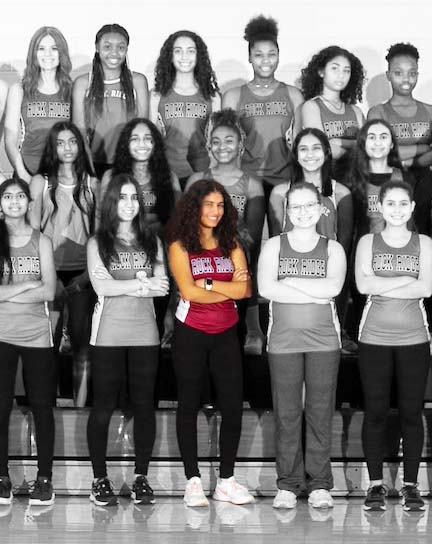
Junior Track Thrower Jahnavi Haryani
Q: What motivated you to start doing track here at Rock Ridge?
Jahnavi Haryani: I felt I should really get included into the sports and the society here because it’s very welcoming. And I heard the track team was a really great team here and my friend also does track, so that definitely motivated me to start.
Q: How has track impacted your life? What have you learned about yourself from track?
JH: I think I learned a lot about my athletic capabilities from track. I also learned a lot about my stamina, and how I can manage my time with school work and other extracurriculars while doing sports.
Q: Have you faced any challenges in track?
JH: Usually when it comes to throwing, most people assume that you have to have a good height and really good stamina and all this stuff. My mindset was like ‘I couldn’t throw’ because of certain physical aspects. It was blocking until I changed it into a growth mindset: ‘you can still do things like this.’
Q; What would you say to anybody that’s interested in participating in sports or track specifically?
JH: Even if you have never run before, I’ve seen a lot of people go from not running at all to being able to run for good distances. And it increases your stamina, it really does. It puts you in a different mindset and a different mood, and it can be pretty relaxing if you have a lot of stress on your mind.
Freshman Field Hockey and Basketball Player Nanci Marcello
Q: What motivated you to play field hockey and basketball?
NM: My mom was my motivation [to play field hockey]. She played field hockey in her high school years and she wanted me to give it a shot, [and] I wanted to try a new sport. My grandpa was my motivation for basketball. He’s always told me he sees great potential with me in basketball, and he pushed me to try out finally after years of just watching me shooting hoops in the backyard since I was little up until now. He [also] played basketball when he was younger and was very good at it, which pushed me even more to try out and see what I could accomplish.
Q: How has playing sports impacted your life? What have you learned about yourself from playing sports?
NM: [Field hockey] has impacted my life in many different ways. I find it as an escape from reality and it clears my mind from things I stress about and have no control over. [Through playing], I’ve learned that nothing is handed to you. You have to earn what you want, and that hard work pays off.
